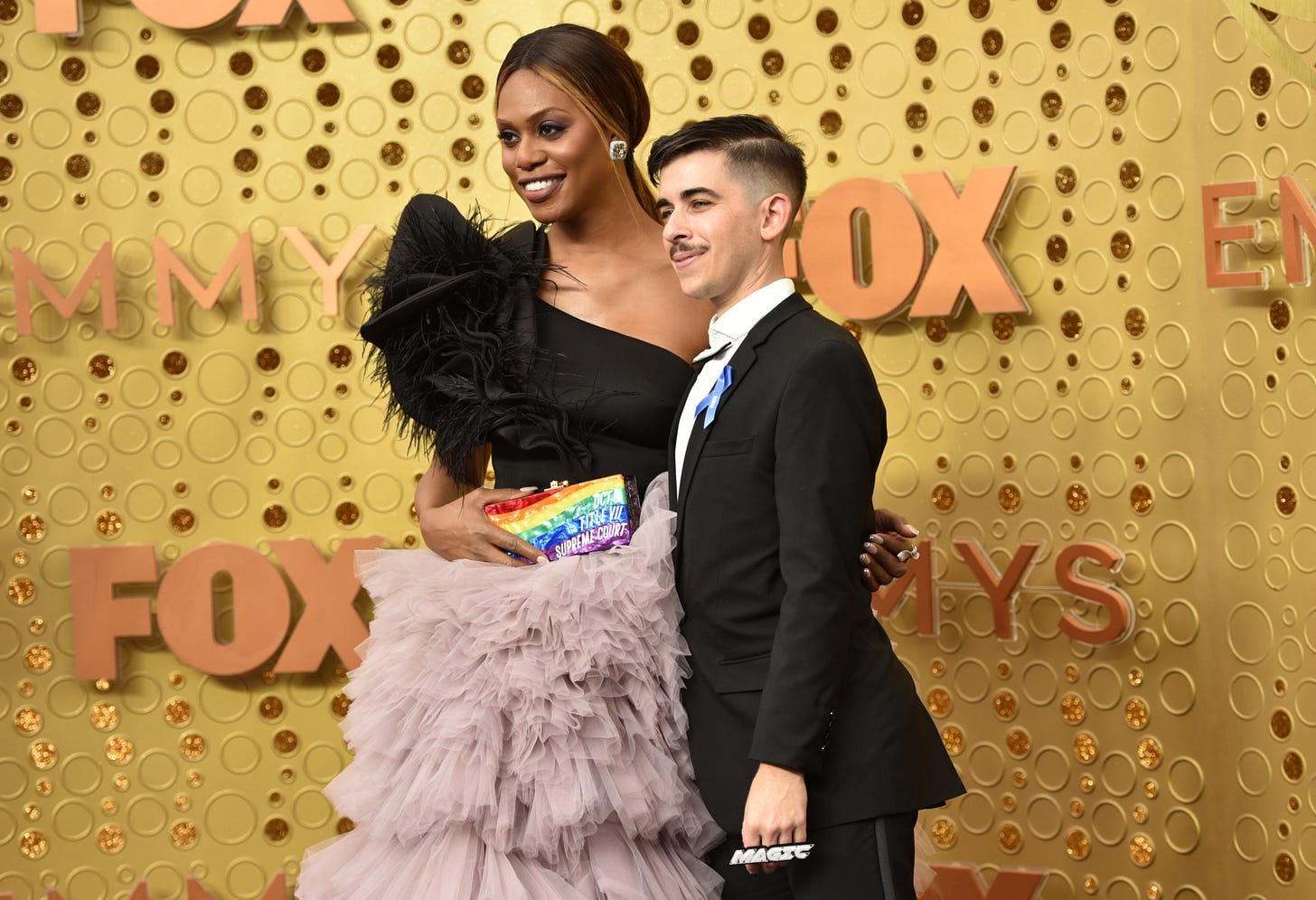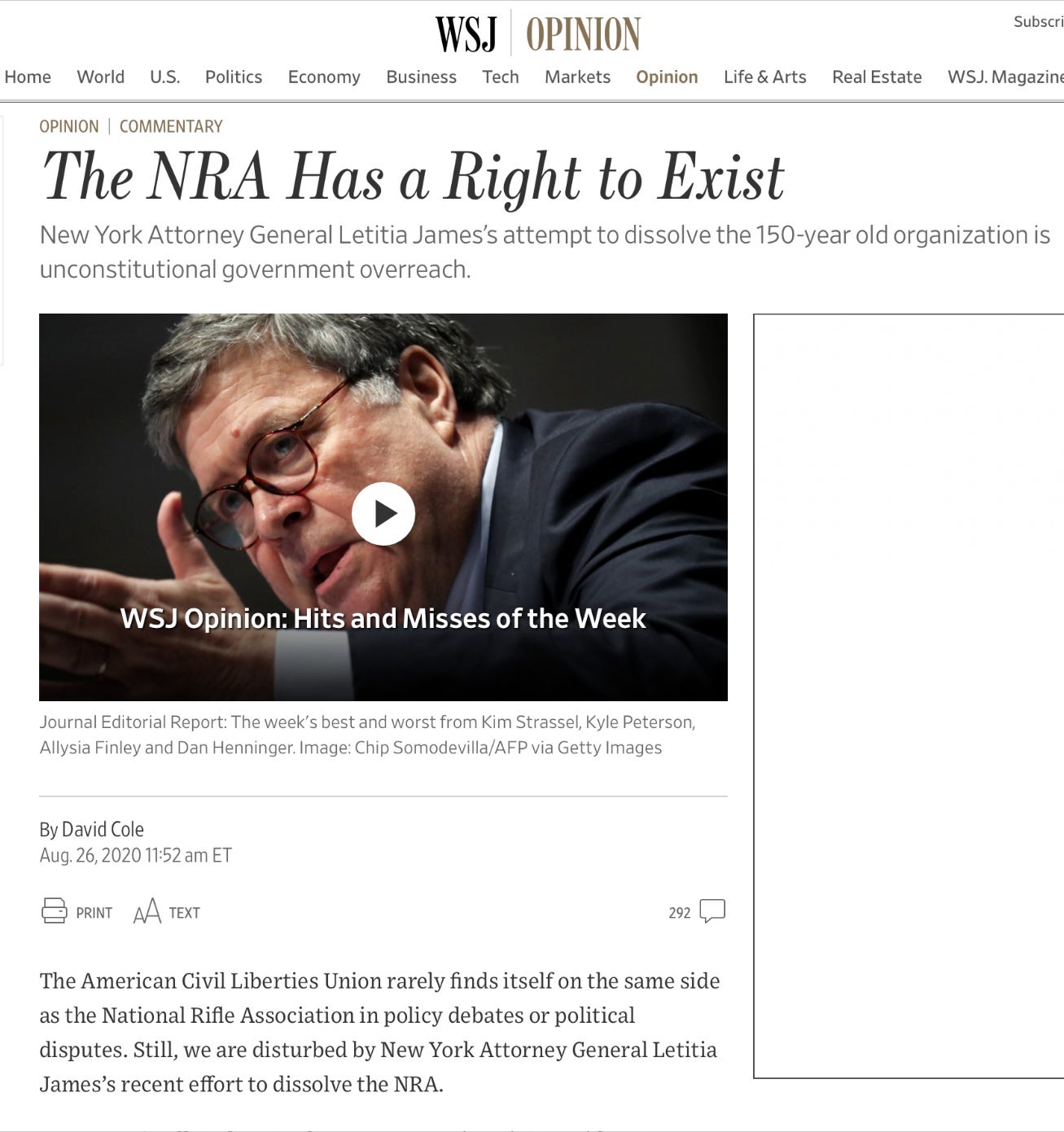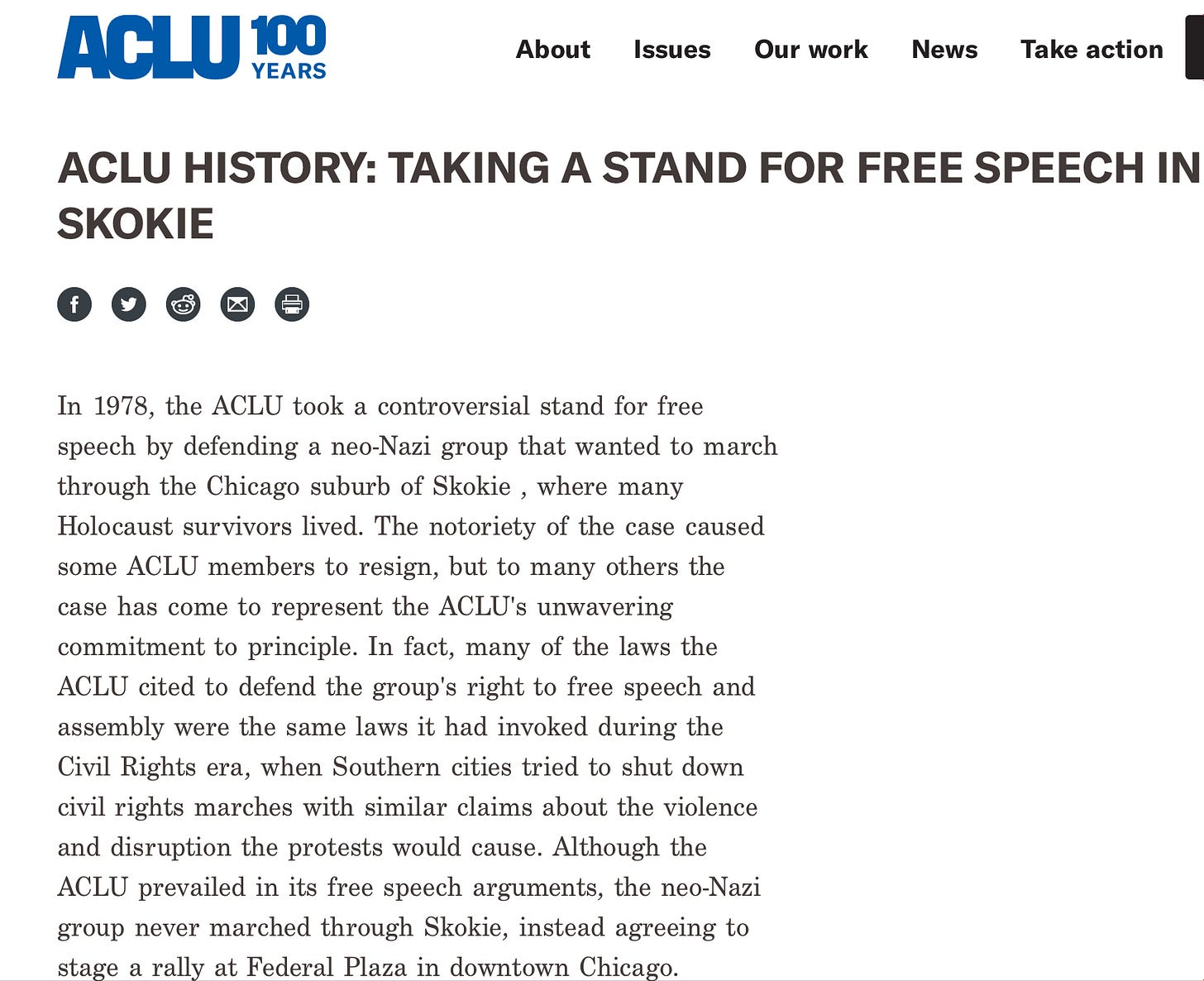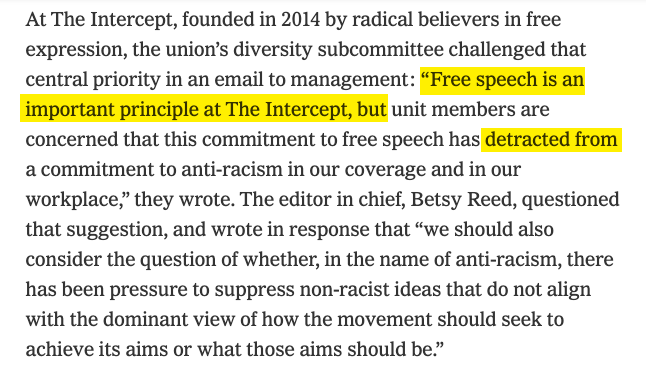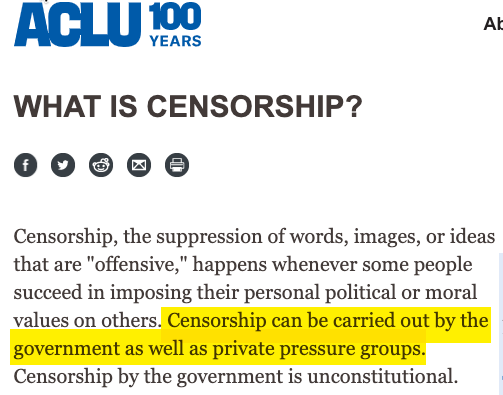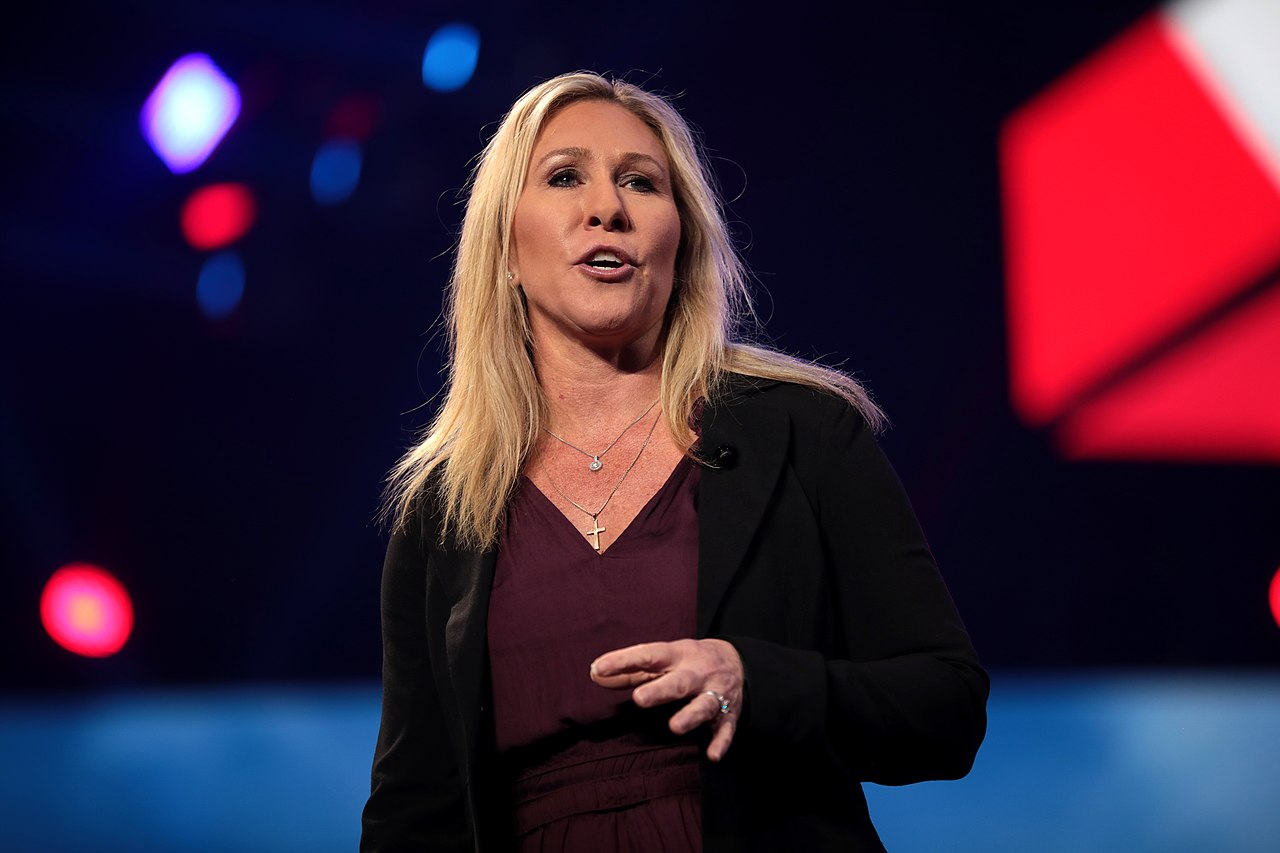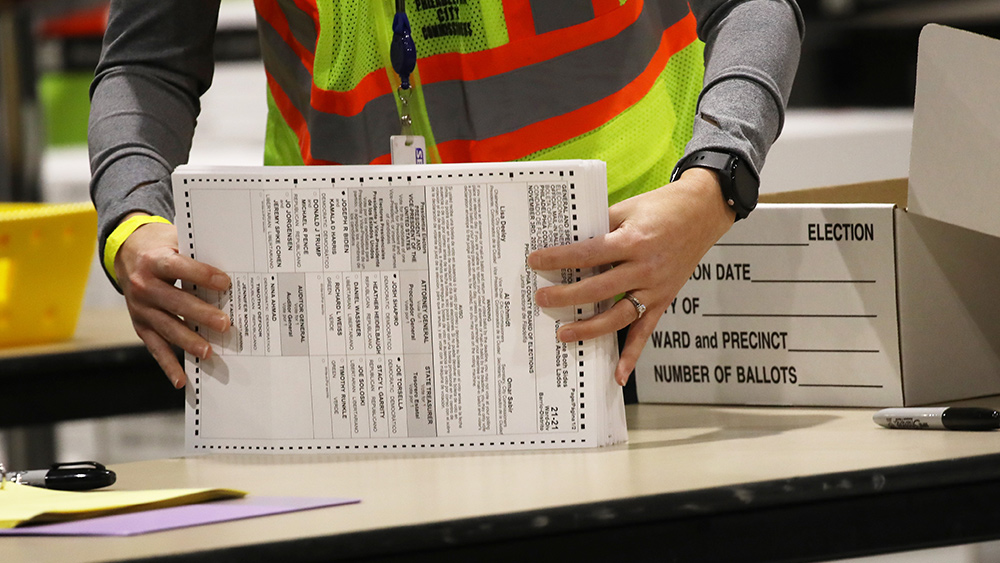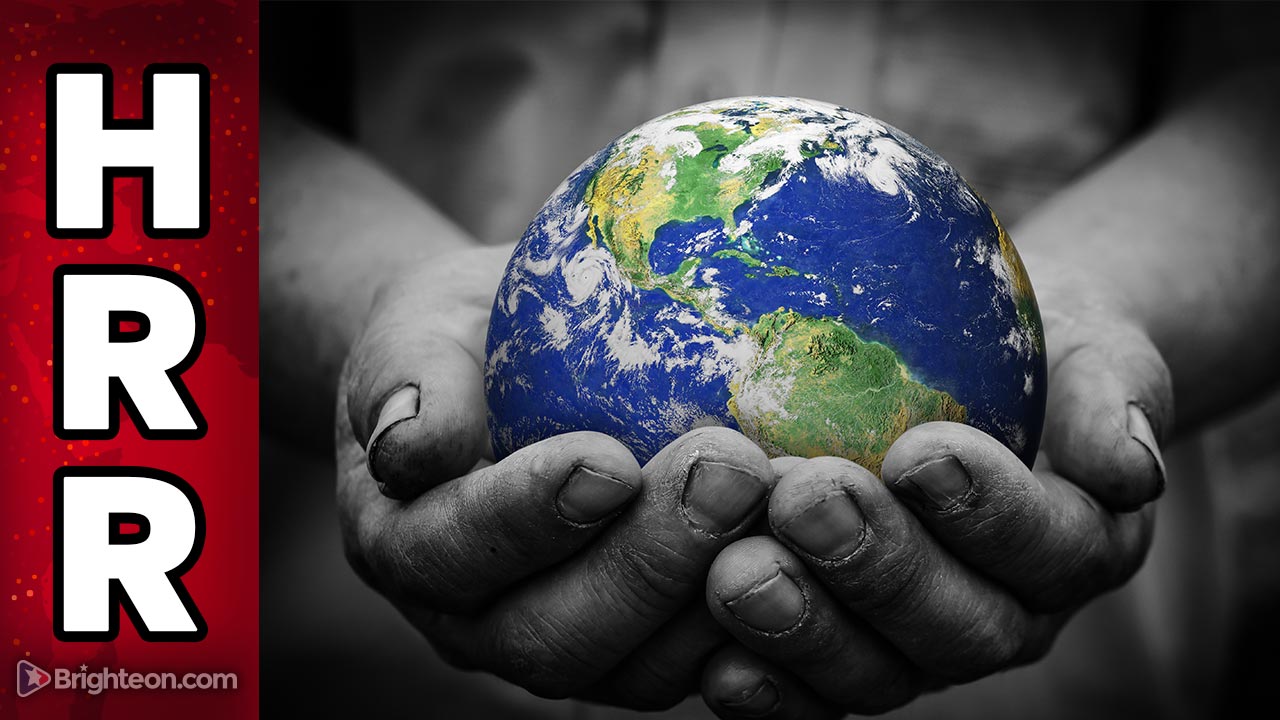The ongoing death of free speech: Prominent ACLU lawyer cheers suppression of a new book
11/17/2020 / By News Editors

In May of 2019, a source in Brazil provided me with a massive archive of secret documents downloaded from the telephones of powerful Brazilian officials that consumed the next year of my life while reporting it (a new Wired article published on Friday tells part of that story). One of the effects of the ensuing intense controversies was that I was unable to finish an article I had been working on for months at the time: a lengthy, deeply reported examination of the internal war engulfing the ACLU, fueled by a raging conflict between its more traditional lawyers who still believe in the primacy of free speech and the need to defend it and the newer political liberal activists and lawyers who do not.
(Article republished from Greenwald.Substack.com)
Among the people I interviewed was the organization’s long-time Executive Director, Anthony Romero, who was forced to navigate the post-Charlottesville controversy with a series of increasingly confusing statements designed to appease not only public and donor anger over the defense by ACLU lawyers of the right of white supremacists to march (after one killed a protester with his car) but also internal rage that ACLU lawyers took that free speech case. Romero insisted to me that the ACLU had not retreated from its historic commitment to free speech nor its resolve to avoid partisan politics despite a series of post-Charottesville memos and a highly-funded election campaign that certainly gave the opposite appearance.
Numerous ACLU staffers told me that one of the most vocal and effective advocates for a more “nuanced” free speech approach was Chase Strangio, the ACLU’s Deputy Director for Transgender Justice of its LGBT & HIV Project, who I also interviewed. I knew Strangio as an excellent lawyer who earned my admiration from his years of dedication representing WikiLeaks whistleblower Chelsea Manning, and I joined him once at the ACLU headquarters for a videotaped discussion of that case. A measure of Strangio’s massive influence is his inclusion in this year’s TIME 100 list, with a tribute from actress Laverne Cox.
My interview with Strangio was too long ago for me to comfortably summarize it, but suffice to say there was no question that his views on free speech are sharply divergent from those that caused me to regard ACLU lawyers and their free speech absolutism as among my childhood heroes. If you want to hear reasons why the ACLU should be more reluctant to represent the free speech rights of “dangerous” extremists and why free speech should give way to other, more important values — views I vehemently reject — Strangio is about the most thoughtful advocate I’ve heard in defense of that position.
On Friday, Strangio’s very un-ACLU-like views of free speech were on full display. On Friday morning, Abigail Shrier — author of a new book exploring the rapid, massive increase in teenage girls self-identifying as trans boys and undergoing permanent gender reassignment therapies and surgeries in their teens — published an article in Quillette describing the extraordinary efforts by major corporations and various activists to prevent her book from being purchased:
The efforts to block my reporting have been legion, starting with staff threats at a publishing house, which quickly reversed its original intention to publish my book. Once I obtained a stalwart publisher, Regnery, Amazon refused to allow that company’s sales team to sponsor ads on its site. (Amazon allows sponsored ads for books that uncritically celebrate medical transition for teenagers)….
Because the book tackles an interesting phenomenon, a number of established journalists wanted to review it….[T]he issue has created surprising bedfellows. Religious conservatives are concerned about the trend—but so are lesbians, who look upon the shocking numbers of teen girls transitioning with abject alarm. Many suspect that all this transitioning of girls is effectively euthanizing a generation of young lesbians….In any case, every major newspaper and legacy magazine summarily turned interested journalists down.
The recent protest by Spotify employees over Joe Rogan’s podcast was triggered in large part by his decision to invite Shrier onto his program. Many liberal employees inside the streaming service demanded this episode be removed. “Many LGBTQAI+/ally Spotifiers feel unwelcome and alienated because of leadership’s response in [Rogan’s] conversations,” was one of the questions posed to Spotify’s CEO at a tense staff-wide meeting, along with a demand to know why that program had not been deleted from the platform.
Note that what is being discussed here are not efforts to criticize or protest Shrier and her book. Nobody disputes such criticisms would be appropriate. It is much more extreme than that: an effort to prevent others from hearing her views in her book — i.e., censorship: not state censorship, but corporate censorship.
After various commentators noted Shrier’s article, the ACLU’s Strangio stepped forward to say that he not only agreed that the book was inaccurate and harmful — which he obviously has every right to believe — but that he supported and championed the efforts to stop its circulation:
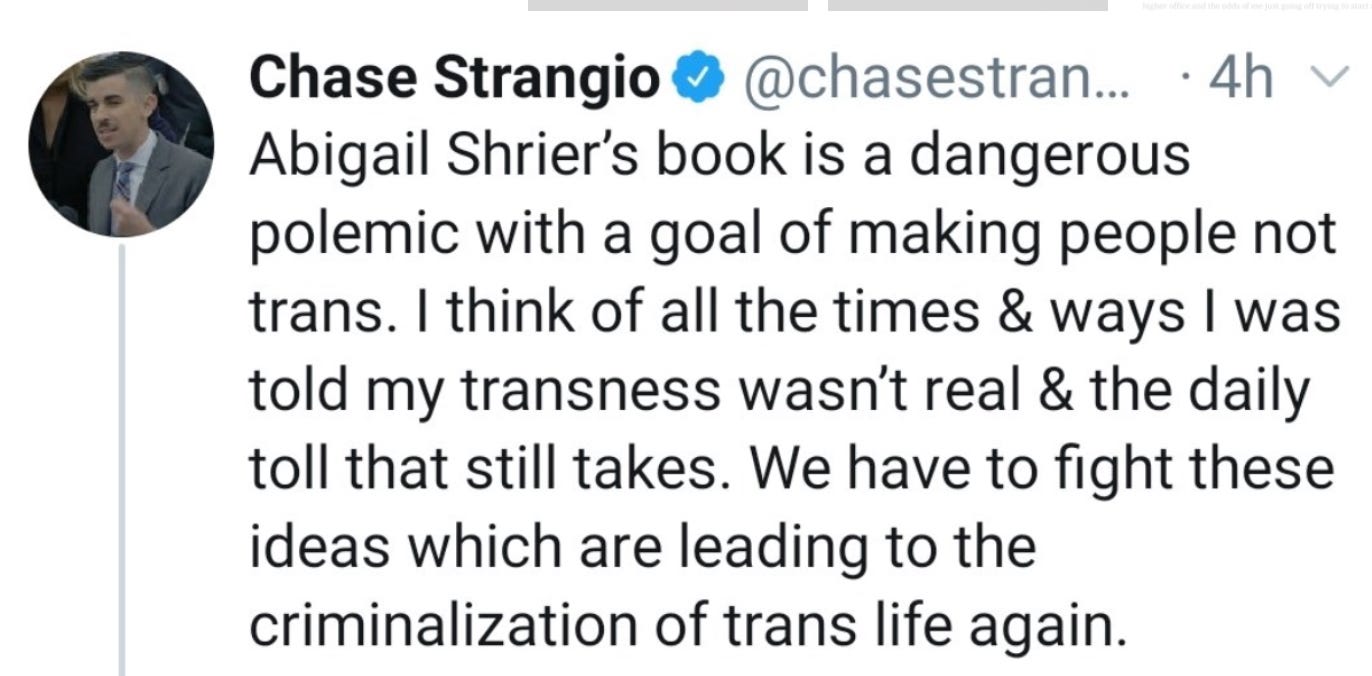
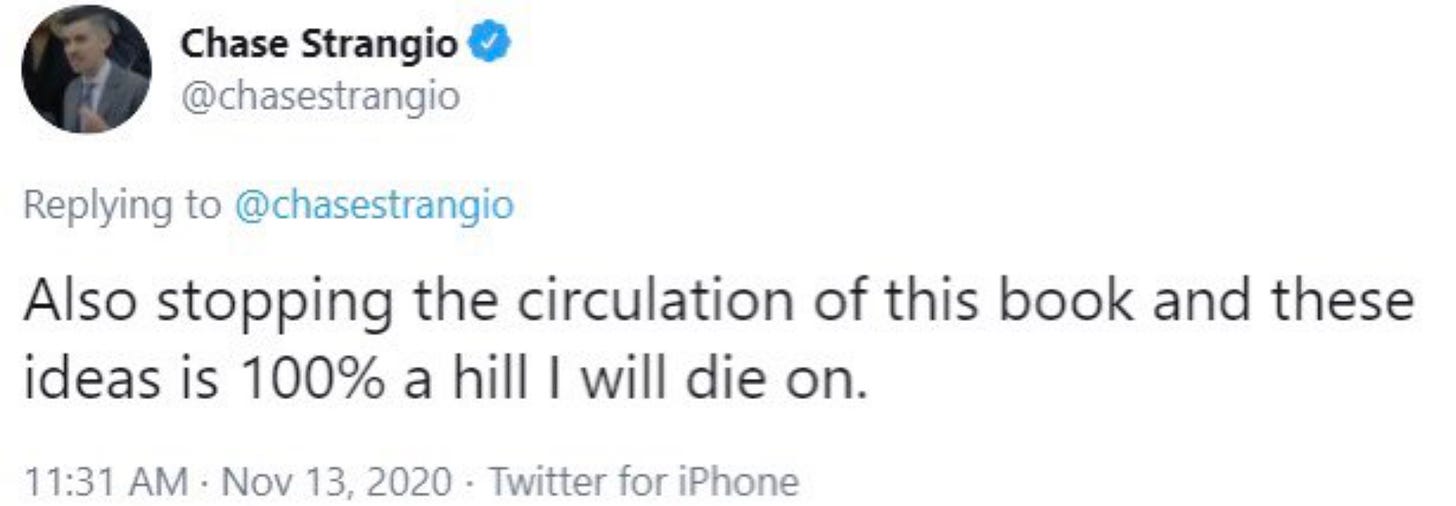
It is nothing short of horrifying, but sadly also completely unsurprising, to see an ACLU lawyer proclaim his devotion to “stopping the circulation of [a] book” because he regards its ideas as wrong and dangerous. There are, always have been, and always will be people who want to stop books from being circulated: by banning them, burning them, pressuring publishing houses to rescind publishing contracts or demanding corporations refuse to sell them. But why would someone with such censorious attitudes, with a goal of suppressing ideas with which they disagree, choose to go to work for the ACLU of all places?
Sometime on Friday, Strangio deleted that second tweet without comment, and then noted he was locking his account. In response to a series of questions I sent Strangio about his position, he told me that he had read the book over the summertime and found it repellent. He said he deleted the tweet because “ there were relentless calls to have me fired, which I found exhausting as I was navigating work and childcare” and “it was supposed to be a cheeky response to Bari [Weiss] not something to be taken on its own terms without that context.” He told me, however, that the book is dangerous:
The book and the arguments contained within it are fueling a wave of bills in state legislatures to criminalize health care for trans youth including through felony bans on the provision of care and forced outing of trans youth by school officials (an actual serious First Amendment concern).
Strangio emphasized that “I am not speaking for the ACLU nor do I have the ACLU in my Twitter bio” and, despite this tweet, insists that he “never advocated with an entity to ban a book.” (My full exchange with Strangio, including his full comments, is here).
It is important to note that Strangio’s views are mostly definitely not shared by everyone at the ACLU. Many of the group’s more traditional free speech advocates still prioritize its civil liberties principles over liberal politics and liberal political causes. As I noted when I defended the organization in 2017 for its free speech representation in Charlottesville, the ACLU has defended Milo Yiannopolous against the Washington Metropolitan Area Transit Authority’s refusal to allow ads for his book, and this year publicly defended the National Rifle Association against the efforts by New York State General Letitia James to disband it.
But for numerous reasons, the ACLU — still with some noble and steadfast dissenters — is fast transforming into a standard liberal activist group at the expense of the free speech and due process principles it once existed to defend. Those reasons include changing cultural mores, an abandonment by millennials and Gen Z activists of the long-standing leftist belief in free speech and replaced by demands that views they dislike be silenced (which in turn causes Gen X and Boomer managers and editors fearful of losing their jobs or being vilified to succumb to this authoritarianism); and a massive influx of #Resistance cash donated to the ACLU not in the name of civil liberties but stopping Trump and the Republicans, much of which was used for political rather than legal staff-building.
Last month, I spoke by video with Ira Glasser, the Executive Director of the ACLU from 1978-2001. Glasser is an old-school civil libertarian who, in that interview, articulated one of the most compelling and persuasive cases for why censorious liberals are not only unethical but incredibly self-defeating. One of Glasser’s first challenges in his new position back then — examined in a great new documentary on the ACLU and civil liberties called “Mighty Ira” — was managing the fallout from the ACLU’s 1978 defense of the right of neo-Nazis to march through Skokie, Illinois, despite the presence of a large group of residents who were not only Jewish but Holocaust survivors.
Glasser is not only adamant to this day about the absolute rightness of that position — emphasizing that both Jewish leftism and African-American civil rights activism had a long tradition of supporting free speech absolutism based on the knowledge that censorship precedents would eventually be turned against them — but he has also harshly criticized the modern-day iteration of the ACLU. In an interview earlier this year, Glasser said that “the ACLU would not take the Skokie case today,” adding that the current Executive Director is “pandering to what he thinks his new constituency wants to hear. . . . They’ve been socialized into a different ACLU.”
I’m not sure that’s entirely true: I know several ACLU lawyers as devoted as ever to free speech principles, including, I believe, Romero. But there have been all sorts of signs from the ACLU — from cheering a French law that criminalizes catcalling to defending the reduction of due process protections for college students accused of sexual assault — that strongly suggest the emergence of liberal political activism at the expense of traditional civil liberties. In sum, the ACLU is being pulled and weighted down by the same censorious trends currently plaguing academia, the corporate world and — most dangerously — news organizations.
Because I have not read Shrier’s book, I have no opinion whatsoever on the argument it makes, though I did watch her Rogan appearance and listened to her Megyn Kelly interview and found several questions she raised to be reasonable and worthy of further examination. I confess to an instinctive discomfort with the book’s title — “Irreversible Damage: The Transgender Craze Seducing Our Daughters” — as redolent of the destructive trope long used against gay men as predators seeking to recruit and “seduce” children into becoming gay. And I know that the legal and cultural assault on trans people is very real, and fervently believe trans people have the absolute right to full legal protection of and respect for their identities (Shrier herself has repeatedly said she also believes this: “I fully support medical transition for mature adults,” she wrote in her Quillette article).
But the question of whether young teens are being misdiagnosed with gender dysphoria, and at what age they are capable of making choices to permanently alter their bodies and identities, is of course a question society is exploring and should be able to explore in good faith without being demonized as bigots. Every significant social reform requires persuasion, which in turn requires debate and discussion to induce people to change how they think rather than badger and threaten and coerce them into doing so.
When I was on Joe Rogan’s program three weeks ago, I told the story of a dinner I had in 2019 with two respected journalists who both have teenaged daughters, one dating a 17-year-old trans boy and the other whose best friend is a 15-year-old trans boy. Both have had surgery to remove their breasts.
These are leftist journalists who are fanatically pro-LGBT and trans rights but wondered, as parents of teenagers, at what age a child is emotionally and psychologically capable of making those choices. It was a fascinating and thought-provoking discussion but one which, I realized afterward, they would never be willing to express in a column or interview for fear of having their reputations destroyed. That is a toxic and deeply unhealthy climate.
Most of this censorious mentality stems from the warped proposition that ideas with which one disagrees are not just misguided but “dangerous” and even “fatal.” We so often hear now that views disliked by some people put them “in danger” and “literally kill.” Recall the creepily unified script of New York Times reporters in response to the Tom Cotton op-ed that resulted in the firing of Op-Ed Page Editor James Bennet for the crime of publishing it: “Running this puts Black @NYTimes staff in danger,” they intoned.
When Matt Yglesias — who just announced his resignation from Vox to head to Substack in part because of the constraints imposed on his ability to speak freely — signed the Harper’s Letter protesting “cancel culture,” a colleague of his, the trans film critic Emily VanDerWerff, publicly accused him of endangering her safety. The Harper’s letter, she proclaimed to Yglesias’ bosses, “ideally would not have been signed by anyone at Vox” because “his signature on the letter makes me feel less safe at Vox.”
I sent a version of this to the editors of Vox. (I have redacted some bits that are internal to Vox and shouldn’t be aired publicly.) pic.twitter.com/splNNSMivd
— Emily Rae Blanchard (@emilyvdw) July 7, 2020
That speech is “dangerous” and “incites violence” and therefore must be stifled has been the cry of censors for centuries. It is the claim used to try to silence Communists during the Cold War, Muslims during the War on Terror, and pro-Palestinian activists now.
And (as I recounted in an article long ago about the effort to criminalize speech in the name of the War on Terror), it is the claim rejected by the U.S. Supreme Court in two landmark rulings: its unanimous 1969 decision in Brandenburg v. Ohio, which overturned the criminal conviction of a KKK leader who had used a speech to threaten violence against political officials, and the 1982 ruling in Claiborne v NAACP, also unanimous, in which the Court held that the First Amendment bars imposing liability on someone for the criminal acts allegedly “inspired” by their speech (that ruling protected NAACP officials from attempts by the State of Mississippi to hold them liable for the violent acts their fiery pro-boycott speeches allegedly incited).
And now, this same pro-censorship mentality is finding expression not only in calls for the state and Silicon Valley giants to suppress speech deemed upsetting and dangerous (censorship that will inevitably fall harshly if not disproportionately on leftists and the marginalized), but also disguising itself under the deceitful banner of Human Resources workplace complaints and union activism. An overlooked section of a Ben Smith column in The New York Times from June described how The Intercept Union’s “Diversity Committee” explicitly demanded curbs on free speech whenever, in their unilateral estimation, such free expression conflicted with political activism they value more — a call that is now commonplace on campuses, in corporate offices, and in newsrooms across the country:
It is true that workplace censorship does not implicate state censorship, just as it is true that increasing calls for Silicon Valley to exert greater control over our discourse does not implicate the First Amendment (although it might if, as seems likely soon, a Biden/Harris presidential administration pressures tech giants to suppress their critics’ speech).
But it takes little imagination to see that there are other forms of censorship besides state censorship. Corporate censorship is one; workplace and cultural censorship are others. Free speech is a constitutional and legal doctrine, but it’s also a cultural norm and societal value. That has been true ever since the Enlightenment, at least.
Those who doubt the existence of private-sector censorship should imagine a scenario in which Facebook, Google and Twitter all unite tomorrow to announce:
Henceforth, no criticisms of the Republican Party or GOP politicians shall be permitted on our platforms; criticisms of Democrats will still be permitted and spread through heightened algorithms, no matter how harsh or angry.
Few would doubt that free speech values would be severely implicated by such a united policy change from tech giants — regardless of whether one agrees with the recent report from the Democratic-led House Subcommittee concluding that Facebook and Google are classic monopolies.
That censorship occurs not only by state action but also cultural and societal coercion has often been explicitly stated by the ACLU itself. That’s why the civil liberties group has referred to Facebook’s banning of offensive speech as “censorship” (“If Facebook gives itself broader censorship powers, it will inevitably take down important speech and silence already marginalized voices,” the ACLU warned). That censorship includes private-actor suppression is also prominently emphasized on its page aptly entitled “What is Censorship”?
That’s what made it so jarring to see an ACLU lawyer — indeed, the group’s most celebrated and popular lawyer — cheering the corporate and cultural repression of a book whose ideas he dislikes. While I believe Strangio’s explanation to me that he did not intend to call on Target and other stores to cease selling the book, as it certainly appeared he was doing, that even ACLU lawyers have the instinct, the reflex, to endorse this sort of suppression impulse illustrates how imperiled, across all societal sectors, this indispensable value of free discourse has become.
Read more at: Greenwald.Substack.com and SpeechPolice.news.
Submit a correction >>
Tagged Under:
ACLU, Censorship, free speech, Glenn Greenwald, lgbtq, mainstream media, political correctness, politics, Social media, society, transgender
This article may contain statements that reflect the opinion of the author
RECENT NEWS & ARTICLES
COPYRIGHT © 2017 FREEDOM NEWS

